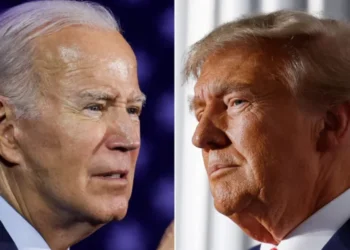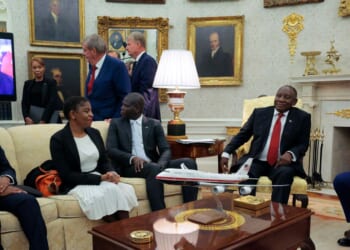German leaders said the move was a “paradigm shift” that “has to happen.”
Much ado has been made about U.S. president Donald Trump‘s renewed calls for NATO members to spend 5 percent of their gross domestic product (GDP) on defense. Some have responded positively, such as the Baltic states (and former Soviet Republics) Estonia and Lithuania and Western European nation Belgium, which had previously been one of the most miserly members of NATO.
Other NATO members have responded negatively. A prime example is Portugal; this past March, Portugal’s outgoing defense minister Nuno Melo cast doubt upon whether Lisbon would follow the recommendation of the Portuguese Air Force (Força Aérea Portuguesa; FAP) to purchase Lockheed Martin’s F-35 Lightning II, notwithstanding the tremendous boon that the FAP would gain from adding that fifth-generation stealth fighter jet to its arsenal. (Currently the FAP fighter fleet consists of twenty-eight U.S.-built F-16s.)
Now, another Western European NATO member has made a surprising announcement in favor of Trump’s 5 percent goal: Germany.
Germany to Boost Defense Spending?
The big news comes to us from UK Daily Mail reporter Olivia Allhusen in an article republished on MSN on or about May 15, 2025, titled “Germany makes bombshell NATO spending announcement following pressure from US president.” To wit:
“Germany‘s new government surprised NATO allies on Thursday by putting forward plans to boost defence spending, to meet a target of five percent of GDP demanded by US President Donald Trump … Foreign Minister Johann Wadephul made the pledge a day after German Chancellor Friedrich Merz, in office for just over a week, said his coalition government intends to have ‘the strongest conventional army in Europe’ … NATO chief Mark Rutte has floated a plan for members to hit the five-percent goal by spending 3.5 percent of GDP on military spending and 1.5 percent on other security measures such as infrastructure and cyber defence … Wadephul, speaking at a NATO meeting in Turkey, pointed to Rutte’s proposal to reach ‘the five percent that President Trump demanded’ and declared that ‘we follow him there’.”
In order to temper the potential excitement and enthusiasm, Allhusen hastened to add that German finance minister Lars Klingbeil struck a more cautious note, saying that “we will spend more on security, but how much that will be we will see in the agreement reached at the NATO summit” to take place in June in The Hague.
That bit of trepidation on Klingbeil’s part notwithstanding, the article concludes on an upbeat note, citing Roderich Kiesewetter, a former senior German military officer and a politician in Merz’s Christian Democratic Union party, who called the announced move a “paradigm shift” and added that “it won’t happen overnight, but it has to happen.”
A Paradigm Shift for Germany
That paradigm shift couldn’t have come a moment too soon: back on February 13, a Reuters reporter penned an article with a rather damningly self-explanatory title: “‘50% battle-ready’: Germany misses military targets despite Scholz’s overhaul.” The Scholz in question is Merz’s predecessor in the chancellor’s seat, Olaf Scholz, who had loftily “promised after Russia’s invasion to overhaul Germany’s decrepit military, but three years later a pledge to provide the NATO alliance with two divisions – typically around 40,000 troops – by 2025 and 2027 faces major setbacks, more than a dozen military officials, lawmakers and defence experts said.”
Moreover, an underwhelming battlefield performance—in Ukraine, that is—on the part of Germany’s Leopard main battle tanks (MBTs) and Pzh 2000 howitzer has cast Germany’s once-vaunted and feared military industrial capabilities in an unflattering light.
Time will tell if this new spending boost will turn around perceptions of Germany’s military prowess.
About the Author: Christian D. Orr
Christian D. Orr was previously a Senior Defense Editor for National Security Journal (NSJ) and 19FortyFive. He is a former Air Force Security Forces officer, Federal law enforcement officer, and private military contractor (with assignments worked in Iraq, the United Arab Emirates, Kosovo, Japan, Germany, and the Pentagon). Chris holds a B.A. in International Relations from the University of Southern California (USC) and an M.A. in Intelligence Studies (concentration in Terrorism Studies) from American Military University (AMU). He has also been published in The Daily Torch, The Journal of Intelligence and Cyber Security, and Simple Flying. Last but not least, he is a Companion of the Order of the Naval Order of the United States (NOUS). If you’d like to pick his brain further, you can ofttimes find him at the Old Virginia Tobacco Company (OVTC) lounge in Manassas, Virginia, partaking of fine stogies and good quality human camaraderie.
Image: DVIDS.













